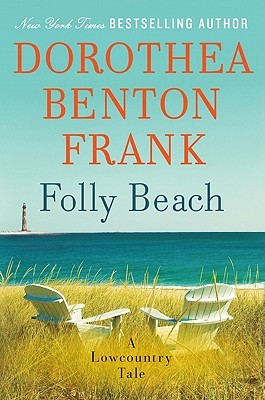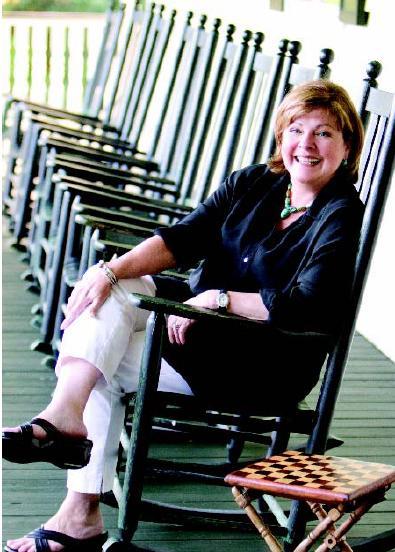In her life and in 12 novels, writer Dorothea Benton Frank never hesitates to put her broad sense of humor on display and show she can deliver a punchline.

Such as her impassioned answer to this question: What impressions has she formed of her fans from hundreds of book-tour appearances over the years?
“This is the honest-to-god truth ― my readers are good-looking,” she said. “They’re not all beauty queens, but they’re cute as a bug, well-groomed and nice. You wouldn’t mind being related to them.”
Pause, then: “I went to a Stephen King book-signing once, and his fans ... I had to sleep with the lights on.”
That was followed by a hearty, throaty laugh, one of many during our phone conversation from her home on Sullivan’s Island, South Carolina.
Frank is the New York Times best-selling author of 12 family-centric stories set in the Lowcountry, a unique area of South Carolina’s southern tip. It’s a well-touristed region where coastal villages mingle with grasslands, winding rivers and white-sand beaches. It’s rich in history, culture, drama and romance, and it’s where Frank was born and grew up.
Frank’s new title, “Folly Beach” (William Morrow, $25.99, 358 pages), is another of her knowing tales of “loss, acceptance and love,” populated with her trademark compassionate and strong-willed characters.
The newly widowed and destitute Cate Cooper returns to the Lowcountry resort town of Folly Beach to move in with her aunt, and must confront a series of life-changing surprises.
“It’s the story of a 40-something woman who is given the opportunity to re-create herself,” Frank said. “In the beginning, she’s the lonely little petunia in the onion patch, but that quickly changes.”
Is this verging on a beach-read romance? “No, my genre doesn’t fit anybody’s mold,” she said. “Maybe it’s contemporary women’s fiction that’s funny, and what’s the matter with funny? I’m a combination of a much younger and better-looking Pat Conroy and Carl Hiaasen, except a girl.”
Frank (“Call me Dottie!”) spent her childhood on Sullivan’s Island (“The whole island was our playground”), attended a Baptist college in nearby Charleston for a year, then went to a fashion school in Atlanta “and got some kind of little associate’s degree in merchandising,” she said.
“Then I went into the garment business in Atlanta, Charleston, San Francisco, Dallas and New York City, and traveled the world. I made more money than my friends with their MBAs. Now I have two honorary doctorate degrees.”

Dorothea Benton’s career in fashion ended when she married investment specialist Peter Frank (“He’s a money guy”), moved from New York City to the upscale township of Montclaire, New Jersey, (home of 40,000 shade trees) and raised two children, now 25 and 22. “You can’t be much of a parent if you’re in Taiwan, Hong Kong and Europe,” she said.
Over the years she became an aggressive community volunteer, raising money for the arts and education. “I was on a lot of boards,” she said. “I’ve always loved the arts, they go hand-in-hand with fashion.”
Frank got into writing in a roundabout way. When she asked her husband to buy her late mother’s house on Sullivan’s Island, in order to keep the property in the family, he refused.
“He said, ‘If you want to buy that house, you need to go back to work,’ which in retrospect was a wonderful thing,” she said. “Our children were 4 and 8, so I had to think of something I could do while they were in school.”
Frank signed up for a creative writing course, bought “every book I could find on how to write a novel,” then turned in a 75-page short story to her writing teacher.
“The president of the community college read the story, came up to me, put his hand on my shoulder and said, ‘I’m going to put the curse on you ― you’re a writer. God save you.’ So I thought, ‘Now I know I can write, let’s give this a shot.’”
“Sullivan’s Island” was published two years later, in 2000, and became a long-running best-seller translated into 10 languages. “The next thing I knew, I had a career. Can you imagine the surprise on my mother-in-law’s face?”
The ensuing years have been “the most fun I’ve ever had,” Frank said. “Thinking up a book is a lot of fun, but after awhile you run out of family members and ex-boyfriends to write about, so you have to start making stuff up. I ran out after the second book.”
Frank divides her time between homes in Montclaire and Sullivan’s Island. The barrier island, a 20-minute drive from Charleston on a busy day, is regarded as a “suburb” of that city. Frank’s heart is clearly there. “It’s paradise,” she said. “When I get down here and I’m in the room with my sister for a half-hour, I begin to sound Southern again.”
Though the three decades she has spent “back East” have qualified her as “a city girl,” Frank said she will “always bring a Southern sensibility to everything I write. People are still fascinated by the South, it’s so rich. I always want to come back to the Lowcountry and be with the people I love.”
Bill Thompson, the books editor for the Charleston Post and Courier, has written about Frank and her novels.
“Her personality really comes through in them,” he said on the phone. “It’s ebullient and genuine, and she’s quite funny and bright. She looks back on her years of growing up here through a romantic lens.”
As for the effect of her bibliography on the Lowcountry, Thompson said, “It’s certainly enhanced it as a tourist destination, and has spawned a legion of imitators.”
Part of the plot in “Folly Beach” involves two of the most visible players in the cultural revival known as the Charleston Renaissance of the 1920s and 1930s.
Artist-writer Dorothy Heyward set aside her own career as a playwright to help foster that of her husband, Edwin DuBose Heyward. They co-wrote the 1925 novel “Porgy” and later adapted it to the stage for what eventually became the 1935 folk musical “Porgy and Bess.” George Gershwin wrote the music.
“Folly Beach” is just one of the novels Frank has researched in the archives of the magnolia-drenched South Carolina Historical Society in Charleston.
“She has uncovered a great deal of history, and that’s another thing we particularly like about her books. They’re wonderful fiction, but she also entwines the past in almost all of them,” said the society’s executive director, Faye Jensen. “From our viewpoint, that’s fabulous because Charleston is a place that very much lives its history. She’s staying true to her home roots.”
By Allen Pierleoni, McClatchy Newspapers
(McClatchy-Tribune Information Services)



![[AtoZ into Korean mind] Humor in Korea: Navigating the line between what's funny and not](http://res.heraldm.com/phpwas/restmb_idxmake.php?idx=644&simg=/content/image/2024/04/22/20240422050642_0.jpg&u=)

![[Exclusive] Korean military set to ban iPhones over 'security' concerns](http://res.heraldm.com/phpwas/restmb_idxmake.php?idx=644&simg=/content/image/2024/04/23/20240423050599_0.jpg&u=20240423183955)

![[Herald Interview] Why Toss invited hackers to penetrate its system](http://res.heraldm.com/phpwas/restmb_idxmake.php?idx=644&simg=/content/image/2024/04/22/20240422050569_0.jpg&u=20240422150649)
![[Graphic News] 77% of young Koreans still financially dependent](http://res.heraldm.com/phpwas/restmb_idxmake.php?idx=644&simg=/content/image/2024/04/22/20240422050762_0.gif&u=)






![[Exclusive] Korean military to ban iPhones over security issues](http://res.heraldm.com/phpwas/restmb_idxmake.php?idx=652&simg=/content/image/2024/04/23/20240423050599_0.jpg&u=20240423183955)



![[Today’s K-pop] Ateez confirms US tour details](http://res.heraldm.com/phpwas/restmb_idxmake.php?idx=642&simg=/content/image/2024/04/23/20240423050700_0.jpg&u=)